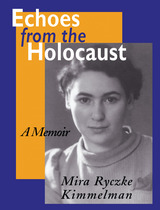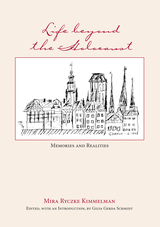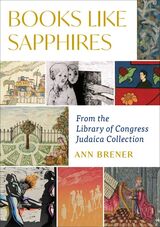2 books by Kimmelman, Mira Ryczke

Echoes From The Holocaust
A Memoir
Mira Ryczke Kimmelman
University of Tennessee Press, 1996
Echoes from the Holocaust
A Memoir
Mira Ryczke Kimmelman
"During the most difficult times of World War II," Mira Kimmelman writes, "I wondered whether the world really knew what was happening to us. I lived in total isolation, not knowing what was taking place outside the ghetto gates, outside the barbed wires of concentration camps. After the war, would anyone ever believe my experiences?"
Kimmelman had no way of preserving her experiences on paper while they happened, but she trained herself to remember. And now, as a survivor of the Holocaust, she has preserved her recollections for posterity in this powerful and moving book—one woman's personal perspective on a terrible moment in human history.
The daughter of a Jewish seed exporter, the author was born Mira Ryczke in 1923 in a suburb of the Baltic seaport of Danzig (now Gdansk, Poland). Her childhood was happy, and she learned to cherish her faith and heritage. Through the 1930s, Mira's family remained in the Danzig area despite a changing political climate that was compelling many friends and neighbors to leave. With the Polish capitulation to Germany in the autumn of 1939, however, Mira and her family were forced from their home. In calm, straightforward prose—which makes her story all the more harrowing—Kimmelman recalls the horrors that befell her and those she loved. Sent to Auschwitz in 1944, she escaped the gas chambers by being selected for slave labor. Finally, as the tide of war turned against Germany, Mira was among those transported to Bergen-Belsen, where tens of thousands were dying from starvation, disease, and exposure. In April 1945, British troops liberated the camp, and Mira was eventually reunited with her father. Most of the other members of her family had perished.
In the closing chapters, Kimmelman describes her marriage, her subsequent life in the United States, and her visits to Israel and to the places in Europe where the events of her youth transpired. Even when confronted with the worst in humankind, she observes, she never lost hope or succumbed to despair. She concludes with an eloquent reminder: "If future generations fail to protect the truth, it vanishes. . . . Only by remembering the bitter lesson of Hitler’s legacy can we hope it will never be repeated. Teach it, tell it, read it."
The Author: Mira Ryczke Kimmelman is a resident of Oak Ridge, Tennessee, and lectures widely in schools about her experiences during the Holocaust.
A Memoir
Mira Ryczke Kimmelman
"During the most difficult times of World War II," Mira Kimmelman writes, "I wondered whether the world really knew what was happening to us. I lived in total isolation, not knowing what was taking place outside the ghetto gates, outside the barbed wires of concentration camps. After the war, would anyone ever believe my experiences?"
Kimmelman had no way of preserving her experiences on paper while they happened, but she trained herself to remember. And now, as a survivor of the Holocaust, she has preserved her recollections for posterity in this powerful and moving book—one woman's personal perspective on a terrible moment in human history.
The daughter of a Jewish seed exporter, the author was born Mira Ryczke in 1923 in a suburb of the Baltic seaport of Danzig (now Gdansk, Poland). Her childhood was happy, and she learned to cherish her faith and heritage. Through the 1930s, Mira's family remained in the Danzig area despite a changing political climate that was compelling many friends and neighbors to leave. With the Polish capitulation to Germany in the autumn of 1939, however, Mira and her family were forced from their home. In calm, straightforward prose—which makes her story all the more harrowing—Kimmelman recalls the horrors that befell her and those she loved. Sent to Auschwitz in 1944, she escaped the gas chambers by being selected for slave labor. Finally, as the tide of war turned against Germany, Mira was among those transported to Bergen-Belsen, where tens of thousands were dying from starvation, disease, and exposure. In April 1945, British troops liberated the camp, and Mira was eventually reunited with her father. Most of the other members of her family had perished.
In the closing chapters, Kimmelman describes her marriage, her subsequent life in the United States, and her visits to Israel and to the places in Europe where the events of her youth transpired. Even when confronted with the worst in humankind, she observes, she never lost hope or succumbed to despair. She concludes with an eloquent reminder: "If future generations fail to protect the truth, it vanishes. . . . Only by remembering the bitter lesson of Hitler’s legacy can we hope it will never be repeated. Teach it, tell it, read it."
The Author: Mira Ryczke Kimmelman is a resident of Oak Ridge, Tennessee, and lectures widely in schools about her experiences during the Holocaust.
[more]

Life Beyond the Holocaust
Memories and Realities
Mira Ryczke Kimmelman
University of Tennessee Press, 2005
“For the rare Jews of Poland who managed to survive the Holocaust, the very idea of a return to what had been one’s homeland might seem both physically and psychologically impossible, perhaps even absurd. Yet it is precisely this paradoxical journey that Mira Kimmelman undertakes with great dignity and generosity. In words that are both direct and intimate, she exposes the ambivalence of what it means to learn to live again after Auschwitz—to experience love, raise a family, and assume a steadfast place in the Jewish community of a new land. At the same time, she acknowledges the abyss of losses that can never be retrieved. Perhaps even more importantly, Mira reveals how the pain of a return is transformed into a new adventure of discovery and reconciliation to be shared with her sons, their families, and her readers for generations to come.”—Karen D. LevyProfessor of French StudiesUniversity of Tennessee
“This book is written with intelligence, sensitivity, and eloquence. As a post-Holocaust memoir, it is an excellent volume, inasmuch as it brings out the scope of the Holocaust, its impact on future generations, and how it affects our understanding of past generations. The author explores and elucidates the problems of liberation from death and the return to life that forever confront Holocaust survivors.” —David Patterson Bornblum Chair in Judaic Studies University of Memphis
“Life beyond the Holocaust brings to mind in its power to document painful memories Primo Levi’s The Reawakening. Ms. Kimmelman’s memoir is, above all, a beautiful love story of herself and her husband, Max. She writes in a vernacular style that evokes her experiences with specific details. Her book is alive … and celebrates in good prose human values triumphing over radical evil.” —Hugh Nissenson
“This book is written with intelligence, sensitivity, and eloquence. As a post-Holocaust memoir, it is an excellent volume, inasmuch as it brings out the scope of the Holocaust, its impact on future generations, and how it affects our understanding of past generations. The author explores and elucidates the problems of liberation from death and the return to life that forever confront Holocaust survivors.” —David Patterson Bornblum Chair in Judaic Studies University of Memphis
“Life beyond the Holocaust brings to mind in its power to document painful memories Primo Levi’s The Reawakening. Ms. Kimmelman’s memoir is, above all, a beautiful love story of herself and her husband, Max. She writes in a vernacular style that evokes her experiences with specific details. Her book is alive … and celebrates in good prose human values triumphing over radical evil.” —Hugh Nissenson
[more]
READERS
Browse our collection.
PUBLISHERS
See BiblioVault's publisher services.
STUDENT SERVICES
Files for college accessibility offices.
UChicago Accessibility Resources
home | accessibility | search | about | contact us
BiblioVault ® 2001 - 2024
The University of Chicago Press









